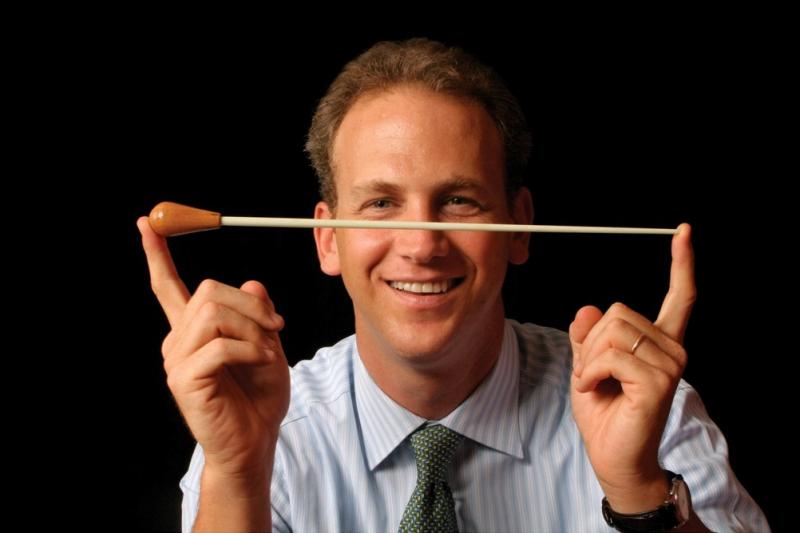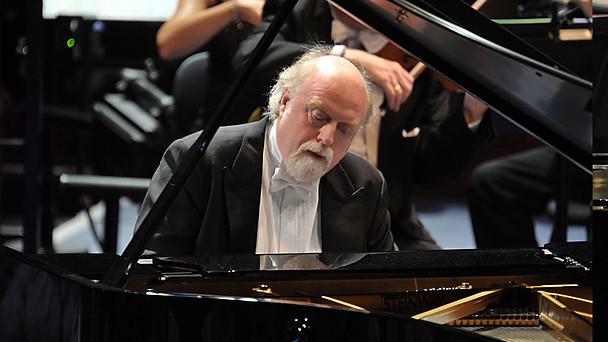Donohoe, BBCSSO, Prieto, City Halls, Glasgow | reviews, news & interviews
Donohoe, BBCSSO, Prieto, City Halls, Glasgow
Donohoe, BBCSSO, Prieto, City Halls, Glasgow
Impressive, weighty Scottish debut by Brazilian conductor in Shakespeare-led programme

Shock and Shakespeare were the two forces that powered a typically thoughtful programme from the BBC Scottish Symphony Orchestra. I said as much in a pre-performance talk where the links weren’t hard to find: that also means coming clean at the start about my involvement. But the world needs to know about this one.
Even the popular component on the programme, a selection of “concert movements” from Prokofiev’s Romeo and Juliet, was out of the ordinary. Missing only – and it’s quite an only – the Balcony Scene, it was easily the best sequence I’ve heard in the concert hall, if we really can’t have the complete ballet (and that works best of all, as Gergiev has several times shown in London and Edinburgh). Prieto had a way of producing perfect definition, weight and intensity at mostly quite slow tempi in a way that reminds me of Stokowski protégé José Serebrier. He pulled out of the hat the most powerful of all “Montagues and Capulets” and incredible searing to the limits of possibility in Romeo’s lament and suicide at Juliet’s tomb.
His best coup was to run from the poison coursing through Juliet’s veins at the end of the Second Suite’s composite “Romeo and Juliet Before Parting” straight into the icy violin tremolos that set the scene for the Capulet vault and the last two numbers as they appear in the complete score. We felt as if we’d travelled a whole epic distance at the end of 45 minutes’ worth of the 20th century’s greatest full-length ballet.
 The BBCSSO’s ongoing Shakespeare season also gave us a rarity, Liszt’s Hamlet – last of his symphonic poems but still a pioneer in the genre, composed as it was in 1858, over 30 years before Richard Strauss began to perfect the genre. Despite the rich string sound which promised great things to come from Prieto’s moulding, the ardour couldn’t conceal the thinness of invention or Liszt’s stop-start insistence on highlighting dramatic gestures at the expense of symphonic sweep. The score is rife with programmatic injunctions – Hamlet is “vacillating” and “ironic” towards an all too brief appearance on wind and solo violin of a “shadowy” and “lamenting” Ophelia. Though short for its kind at 15 minutes, the work still outstays its welcome – not a patch on Tchaikovsky’s themes and orchestration in his own, longer Hamlet portrait, though credit to Liszt for not sticking in a love-scene or bringing up Fortinbras
The BBCSSO’s ongoing Shakespeare season also gave us a rarity, Liszt’s Hamlet – last of his symphonic poems but still a pioneer in the genre, composed as it was in 1858, over 30 years before Richard Strauss began to perfect the genre. Despite the rich string sound which promised great things to come from Prieto’s moulding, the ardour couldn’t conceal the thinness of invention or Liszt’s stop-start insistence on highlighting dramatic gestures at the expense of symphonic sweep. The score is rife with programmatic injunctions – Hamlet is “vacillating” and “ironic” towards an all too brief appearance on wind and solo violin of a “shadowy” and “lamenting” Ophelia. Though short for its kind at 15 minutes, the work still outstays its welcome – not a patch on Tchaikovsky’s themes and orchestration in his own, longer Hamlet portrait, though credit to Liszt for not sticking in a love-scene or bringing up Fortinbras
In The Berserking, MacMillan outdoes the strife of Prokofiev’s Montagues and Capulets with a musical riot linking frenzied ancient Celts high on booze and drugs with a vain display of ill-directed energy by Glasgow Celtic. I reckon the persistent riff in the first movement cries out “we are the champions”, and it's the first of many bold ideas, though it outstays its welcome – the movement could be trimmed by five minutes – and so do the beautifully scored folksy meanderings of the central movement, however strikingly interrupted by the sound of high overlapping strings which had real shock value in the wonderful City Halls. The piano role is more of a concertante than a virtuoso solo role, though it needs a true heavyweight like Peter Donohoe (pictured above by Chris Christodoulou), who gave the first performance in Glasgow back in 1990 and still sounded on fine form last night.
He even showed a luminous, sensitive side which brought the work to a quiet and spellbinding close after all the rioting. In that, the BBCSSO brass proved the equals of any, just reaching the limits of what this smallish, perfectly formed shoebox hall is capable of handling. Having also heard the orchestra on top form in a Sibelius Seventh up in Inverness, conducted by their main man Donald Runnicles with an understanding of shape and flow far surpassing what Rattle and the Berlin Phil gave us in London a week earlier, I think I can safely say that this team offers heights to match any of the other UK orchestras.
The future of Arts Journalism
You can stop theartsdesk.com closing!
We urgently need financing to survive. Our fundraising drive has thus far raised £49,000 but we need to reach £100,000 or we will be forced to close. Please contribute here: https://gofund.me/c3f6033d
And if you can forward this information to anyone who might assist, we’d be grateful.

Subscribe to theartsdesk.com
Thank you for continuing to read our work on theartsdesk.com. For unlimited access to every article in its entirety, including our archive of more than 15,000 pieces, we're asking for £5 per month or £40 per year. We feel it's a very good deal, and hope you do too.
To take a subscription now simply click here.
And if you're looking for that extra gift for a friend or family member, why not treat them to a theartsdesk.com gift subscription?
more Classical music
 Hallé John Adams festival, Bridgewater Hall / RNCM, Manchester review - standing ovations for today's music
From 1980 to 2025 with the West Coast’s pied piper and his eager following
Hallé John Adams festival, Bridgewater Hall / RNCM, Manchester review - standing ovations for today's music
From 1980 to 2025 with the West Coast’s pied piper and his eager following
 Kaploukhii, Greenwich Chamber Orchestra, Cutts, St James's Piccadilly review - promising young pianist
A robust and assertive Beethoven concerto suggests a player to follow
Kaploukhii, Greenwich Chamber Orchestra, Cutts, St James's Piccadilly review - promising young pianist
A robust and assertive Beethoven concerto suggests a player to follow
 Robin Holloway: Music's Odyssey review - lessons in composition
Broad and idiosyncratic survey of classical music is insightful but slightly indigestible
Robin Holloway: Music's Odyssey review - lessons in composition
Broad and idiosyncratic survey of classical music is insightful but slightly indigestible
 Classical CDs: Wolf-pelts, clowns and social realism
British ballet scores, 19th century cello works and contemporary piano etudes
Classical CDs: Wolf-pelts, clowns and social realism
British ballet scores, 19th century cello works and contemporary piano etudes
 Bizet in 150th anniversary year: rich and rare French offerings from Palazzetto Bru Zane
Specialists in French romantic music unveil a treasure trove both live and on disc
Bizet in 150th anniversary year: rich and rare French offerings from Palazzetto Bru Zane
Specialists in French romantic music unveil a treasure trove both live and on disc
 Scottish Chamber Orchestra, Ibragimova, Queen’s Hall, Edinburgh review - rarities, novelties and drumrolls
A pity the SCO didn't pick a better showcase for a shining guest artist
Scottish Chamber Orchestra, Ibragimova, Queen’s Hall, Edinburgh review - rarities, novelties and drumrolls
A pity the SCO didn't pick a better showcase for a shining guest artist
 Kilsby, Parkes, Sinfonia of London, Wilson, Barbican review - string things zing and sing in expert hands
British masterpieces for strings plus other-worldly tenor and horn - and a muscular rarity
Kilsby, Parkes, Sinfonia of London, Wilson, Barbican review - string things zing and sing in expert hands
British masterpieces for strings plus other-worldly tenor and horn - and a muscular rarity
 From Historical to Hip-Hop, Classically Black Music Festival, Kings Place review - a cluster of impressive stars for the future
From quasi-Mozartian elegance to the gritty humour of a kitchen inspection
From Historical to Hip-Hop, Classically Black Music Festival, Kings Place review - a cluster of impressive stars for the future
From quasi-Mozartian elegance to the gritty humour of a kitchen inspection
 Shibe, LSO, Adès, Barbican review - gaudy and glorious new music alongside serene Sibelius
Adès’s passion makes persuasive case for the music he loves, both new and old
Shibe, LSO, Adès, Barbican review - gaudy and glorious new music alongside serene Sibelius
Adès’s passion makes persuasive case for the music he loves, both new and old
 Anja Mittermüller, Richard Fu, Wigmore Hall review - a glorious hall debut
The Austrian mezzo shines - at the age of 22
Anja Mittermüller, Richard Fu, Wigmore Hall review - a glorious hall debut
The Austrian mezzo shines - at the age of 22
 First Person: clarinettist Oliver Pashley on the new horizons of The Hermes Experiment's latest album
Compositions by members of this unusual quartet feature for the first time
First Person: clarinettist Oliver Pashley on the new horizons of The Hermes Experiment's latest album
Compositions by members of this unusual quartet feature for the first time

Add comment